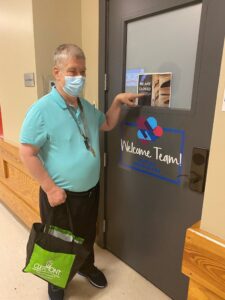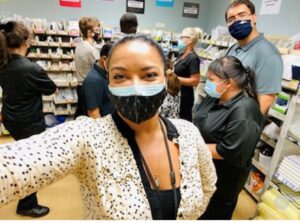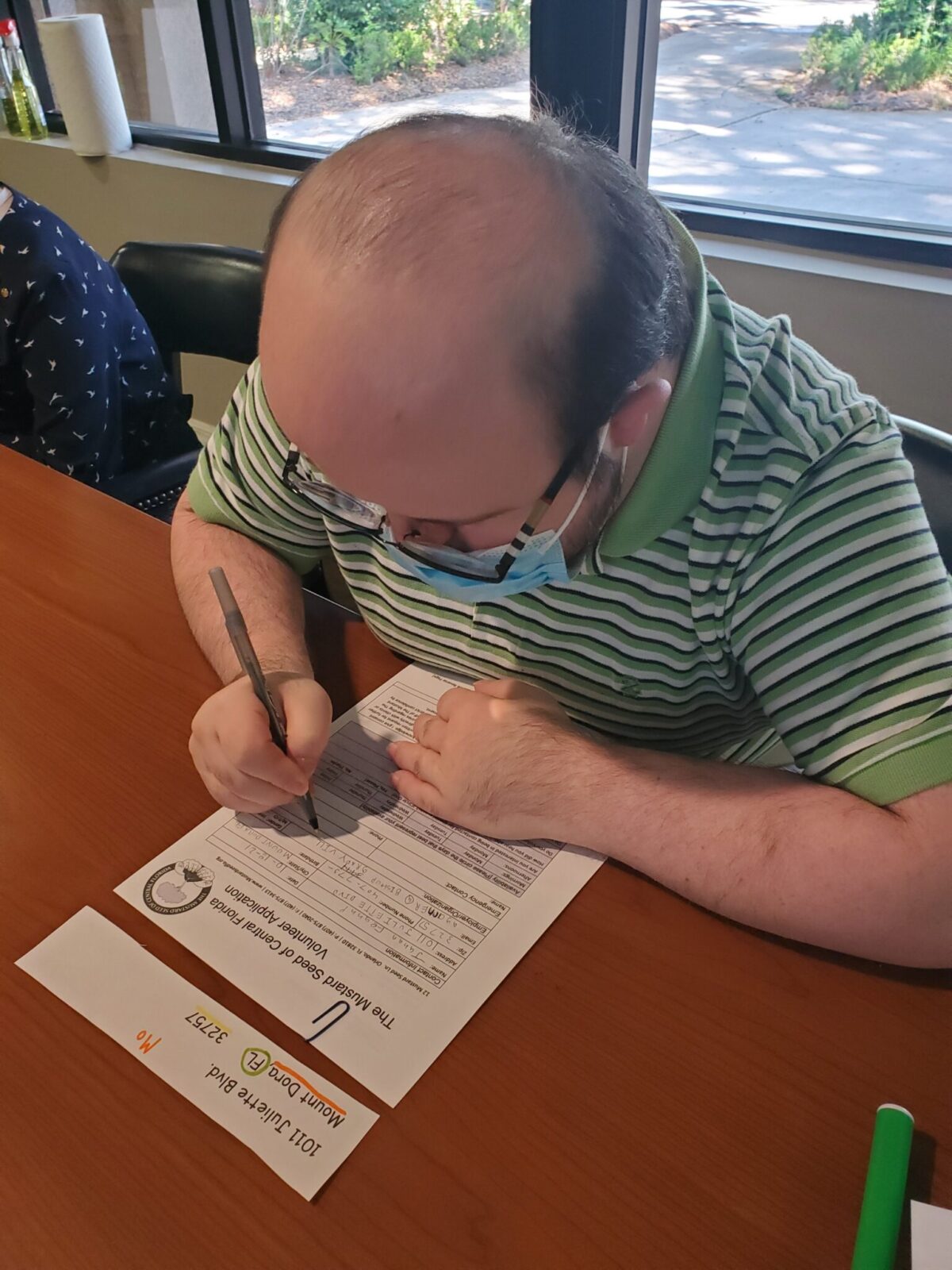ST. CLOUD | “I have something, you have another, and together we have something bigger and more beautiful. This is how we go forward.” These words of Pope Francis, spoken to several hundred disabled persons and their caregivers, sums up the reason behind Magnify, the expanded organization under which the Diocese of Orlando’s work, on behalf of and for disabled persons, is encompassed.
The reveal came during the Bishop Grady Villas’ 17th Annual Harvest Ball, Oct. 16, the annual fundraiser at the Rosen Shingle Creek Resort, for the programs and assisted living provided to persons with disabilities through Bishop Grady Villas.
Bishop Grady Villas opened its doors in 2004, the vision of Sister of St. Joseph Marie Elizabeth Stoup. She wanted Morning Star Catholic School students to have a place to live and grow beyond their school years. She hoped to build a residential community where persons with disabilities could thrive. Last year, Sister Stoup said she was touched seeing some of her former students at Bishop Grady Villas excelling. “I knew they could be independent to a certain extent, but they’ve gone beyond what I thought was possible,” she said.
Today, it comes full circle with Magnify. Magnify encompasses the myriad of programs now offered to people with disabilities, including Bishop Grady Villas – an assisted living community in St. Cloud, life skills development and employment services for residents and other individuals with disabilities in Lake, Orange, Osceola, Polk and Seminole counties.
Executive Director Kevin Johnson said, “Bishop Grady Villas has grown beyond being a place. It’s grown into many ministries that support people throughout the diocese, not just in the assisted-living community in St. Cloud.” Outlining the programs, he noted Project SEARCH – transition services to support people in high school and prepare them to enter the workforce. There is also a Life Skills program in St. Cloud and at Morning Star, helping individuals become active in their communities. And finally, employment services that support adults and youth with employment opportunities, on-the-job training, and ultimately placement and follow along support.

“Magnify really was born out of this concept that we’re instruments of God’s grace to the people we serve,” Johnson said. “We have the opportunity to share and magnify those special gifts and talents that they have and, in turn, God is magnified through the work we do at Bishop Grady Villas.” He added, “We felt a connection to the Blessed Mother’s Magnificat, where she talked about her soul proclaiming the greatness of the Lord.”
“We’ve grown beyond a place, into a ministry that supports people with disabilities in many different ways. Bishop Grady Villas will continue to exist, but Magnify will speak to our mission—the opportunities we have to magnify the gifts and the talents of people with developmental disabilities in our diocese and share those gifts throughout their communities,” Johnson explained.
Like Bishop Grady Villas, the programs stemming from them have also expanded. Project SEARCH began in 2017 with one job training site in Osceola County. Today there are five locations across four counties.
 Desiree Robles, Bishop Grady Villas director of employment and life skills development programs, is excited about Magnify’s new program with Morning Star Catholic School. In August 2021, she and others began working with transition students (ages 18-22) in a day training program. It is Magnify’s first transition program in Orange County. She explained, “Training here involves assisting students with transition from high school to an adult transition program within the county. It is different from Project SEARCH as that program is a full day at a job site.” She explained training for a job comes in stages. First students learn to improve communication skills and build from there through hands-on activities that develop form perception through spatial learning. Interests are identified and built into vocational themes and transferable skills that are marketable. Because many students in the Morning Star transition program are non-verbal, the instructor is extremely creative, taking time to understand communication cues to incorporate appropriate lessons. Robles said asking what these students can do is “like asking what kind of job we can do. It depends on the person and the talent.” Among some options are art, science, horticulture, retail hospitality, food service and much more.
Desiree Robles, Bishop Grady Villas director of employment and life skills development programs, is excited about Magnify’s new program with Morning Star Catholic School. In August 2021, she and others began working with transition students (ages 18-22) in a day training program. It is Magnify’s first transition program in Orange County. She explained, “Training here involves assisting students with transition from high school to an adult transition program within the county. It is different from Project SEARCH as that program is a full day at a job site.” She explained training for a job comes in stages. First students learn to improve communication skills and build from there through hands-on activities that develop form perception through spatial learning. Interests are identified and built into vocational themes and transferable skills that are marketable. Because many students in the Morning Star transition program are non-verbal, the instructor is extremely creative, taking time to understand communication cues to incorporate appropriate lessons. Robles said asking what these students can do is “like asking what kind of job we can do. It depends on the person and the talent.” Among some options are art, science, horticulture, retail hospitality, food service and much more.
She said the students from Morning Star who did not have the opportunity or blessing to be introduced to Project SEARCH have a need for an extended day of transitional services. “This emphasizes the need for Project SEARCH to be extended to adults. This is a school, education collaboration between an employer and a school district. That is the model.” So far it is a great success.
In addition, the adult training program at Bishop Grady Villas, available for residents and others in the community, “provides a meaningful day of activities that include vocational and life skills for adults with mental disabilities.”
Johnson also sits on several boards and the state level, hoping to improve the benefits of the disabled to better serve them. Recently, federal funds of more than $1.1 billion in increased Medicaid funds for home and community-based services were granted, but there are no clear criteria to determine who qualifies for such benefits or how they will be distributed. With new increased minimum wage requirements, organizations like Magnify are struggling to keep up. In a recent article, Johnson noted, he has relied on outside funding to bolster the state Medicaid reimbursement rates and increase salaries for his staff. But the COVID-19 pandemic has created a gap in available funds.
Johnson said, “The rates don’t match the growth in costs to provide services.” The government funds can be a gamechanger. Finding skilled providers and caregivers is an added obstacle. Johnson is working to bridge the gap.
Yet as he looks ahead, he is hopeful. Programs like Project SEARCH and skills training are making a difference and are growing each day due to an ever-increasing need as more people are diagnosed with developmental disabilities.
“The vision (for Magnify) is to have a brand that can continue to grow and can fully connect to all the ministries we are already providing,” he said. “It is defined, not so much by a place, but by who we are, our mission and who we are to become. It will give us the opportunity to continue to grow as the Holy Spirit leads us to find future opportunities to support individuals with disabilities.”
By Glenda Meekins of the Florida Catholic, October 21, 2021


